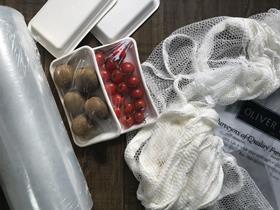
Bolton-based wholesaler Oliver Kay has begun supplying its growers with compost made from its surplus fresh produce as part of wider efforts to tackle food waste and switch to compostable packaging.
Working with waste management firm Re-Source,Oliver Kay has sped up the composting process by using a “screw press” which removes the water from fruit and vegetable waste to reduce the density of the load by 90 per cent and leave only organic waste behind.
The resulting compost can be collected by growers when they deliver their produce to Oliver Kay and taken back to use on the fields.
The screw press is fully automated; waste passes through in minutes; and it requires a very low level of energy to run it, Oliver Kay said.
Paul Ellison from Re-Source commented: “We are excited to be working with a proactive team who have a genuine desire for best practice. Our aim is to implement a turn-key solution at Oliver Kay, to be the market leader in environmental and green practice solutions, with 100 per cent landfill diversion.”
On the packaging front, Oliver Kay has switched from single-use polystyrene trays to compostable trays made from sugarcane. Known as Bagass Trays, they are produced by Preston-based company Thompson Packaging.
The wholesaler is still on the lookout for a compostable substitute to its plastic wrap but this has at least been made fully recyclable.
“We looked at moving to biodegradable packaging, but realised that to really make a difference all of the packaging needed to be compostable,” said commercial and sustainability director Paul Leyland.
Items such as oranges, lemons and limes, which have historically been packed in plastic netting, have now been switched to a more durable and stronger product which is fully compostable.
The new compostable netting is manufactured from Beech wood grown in PEFC-certified forests in Austria and neighbouring countries. Here the wood is turned to pulp and then fibre to create the netting.
Richard Thompson of Thompsons Packing said: “We are proud to support Oliver Kay in their move to sustainable packaging. It is extremely important to us that companies such as ours take the initiative and commit to working closely with our partners.”
The newly implemented processes affect 80 per cent of Oliver Kay’s packaging, with the remaining 20 per cent being plastic bags used to package items such as peppers and spring cabbage.
The next step for Oliver Kay is to find a compostable or recyclable solution for these products too.
Oliver Kaye was keen to stress that its green efforts were not a new thing for the company and the company has been “zero-to-landfill” for several years.
“Roughly four years ago we introduced Oliver Kay-branded plastic bags for packing customer orders,” said Leyland. “These bags have an additive in them, making them biodegradable.
“As a business we have also been separating out cardboard waste for a few years, with our cardboard compactor becoming operational two years ago.
“When it comes to food waste, we have been supporting local charities and organisations for a few years. Our aim has always been to minimise our waste, and reuse or recycle any that we do have.”
Oliver Kay’s holding company Bidfresh has supported Leyland with his pilot project and the company’s chief executive Stephen Oswald said he would be rolling out similar measures across the rest of the organisation.
“We must ensure that all our packaging is compostable in the future,” he said.
Operating from two main warehouses – one in Bolton and the other in the West Midlands – Oliver Kay delivers to around 3,500 catering establishments six days a week and receives around 10,000kg of cardboard boxes every day.
At present, the company buys roughly 800 nets of lemons and 320 trays of chillies a day, producing approximately 2.5 tonnes of food waste on a daily basis.



